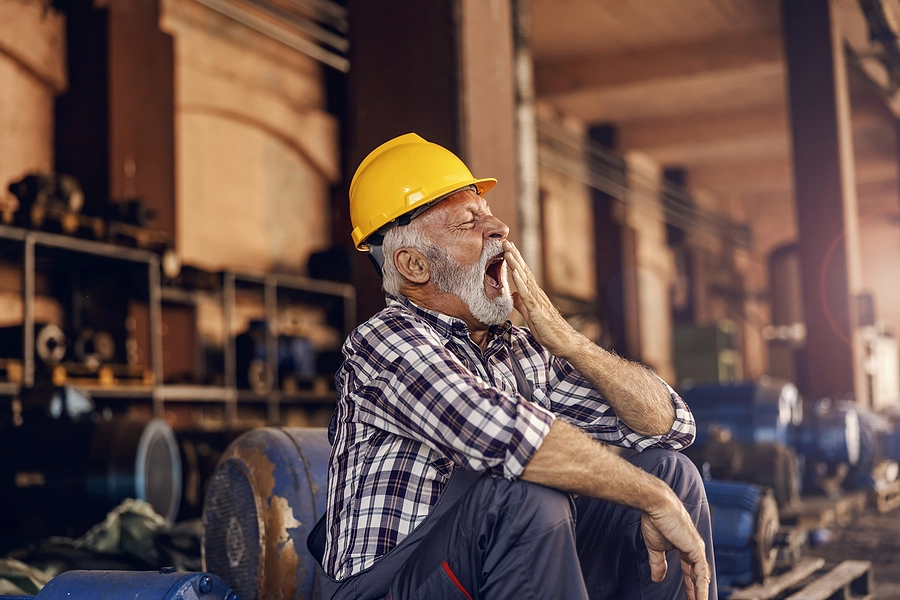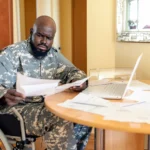Sleep apnea can produce a range of harmful effects on a veteran’s health, finances, and ability to enjoy life.
Summary
- Sleep apnea can lead to life-threatening physical health issues for veterans, including heart disease, diabetes, and stroke.
- Veterans with sleep apnea VA ratings may experience significant psychological effects due to lack of quality sleep. Mental health effects can include depression, anxiety, irritability, memory issues, and impulsive behaviors.
- Managing sleep apnea can be costly due to medical expenses for treatments like CPAP machines and related supplies. Additionally, sleep apnea can affect job performance, potentially leading to reduced income or job loss.
- Veterans may be able to claim VA disability benefits for secondary conditions caused by service-related sleep apnea.
As veterans with service-related sleep apnea know, living with the condition makes you more susceptible to other chronic health problems. You’ll need an attorney who understands the myriad of ways sleep apnea causes harm and who is committed to getting you a sleep apnea VA rating that reflects your experience with the condition.
VetLaw’s diligent, detail-oriented team of veterans disability claims lawyers is ready to go to work for you. We have the appropriate skills and experience with the VA system to help you pursue disability benefits for sleep apnea. Reach out to us at (855) 765-9357 or complete a contact form on our website to set up a free case evaluation.
Sleep Apnea Has Serious Health Costs for Veterans
Generally, a veteran’s sleep apnea VA rating is based on the severity of the condition’s symptoms. However, this does not encompass the full impact that sleep apnea can have on a veteran’s health.
Physical Illnesses Linked to Higher Sleep Apnea VA Ratings
Often, veterans who are diagnosed with sleep apnea begin to display signs of other chronic health conditions. This is attributed to the fact that inadequate and inconsistent sleep deprives the body of the chance to perform critical functions.
For example, a vet with sleep apnea VA rating may develop heart disease because their body was repeatedly interrupted while trying to maintain and fix their blood vessels during the night. The body also regulates blood sugar levels and hunger hormones, repairs cells, and supports a healthy immune response.
When sleep apnea interferes with these tasks, veterans are at an increased risk for:
- Heart disease, arrhythmias, and heart failure
- Kidney disease
- High blood pressure
- High cholesterol
- High blood sugar
- Type II diabetes
- Obesity
- Stroke
Erectile Dysfunction and headaches are also commonly caused by sleep apnea. Veterans may be able to file VA disability claims and obtain benefits for these secondary conditions, provided that they can connect their diagnosis to their service-related sleep apnea.
Psychological and Behavioral Deficits from Sleep Apnea Interruptions
Chronic sleep deprivation is known to impair or alter an individual’s mental and emotional state. Veterans suffering from sleep apnea may wake up dozens or hundreds of times throughout the night when their brain alerts them that they stopped breathing. This prevents them from entering slow wave sleep that restores them for the next day.
Poor sleep is associated with:
- Irritable mood
- Drowsiness or fatigue
- Depression
- Anxiety
- Impulsive behaviors
- Impaired judgment
- Difficulty focusing
- Memory issues and confusion
- Hallucinations or delusions
- Suicidal thoughts
These behaviors can cause problems in veterans’ relationships. Individuals suffering from the effects of chronic sleep deprivation may have short tempers, isolate themselves from others, and forget important details that upset and inconvenience those around them.
If the root cause of their symptoms goes untreated, vets with high sleep apnea VA ratings can injure themselves and others. For example, a veteran suffering from sleep apnea may cause a car accident because they were driving drowsy and misjudged the speed of another vehicle. Or, to cope with their depression, they may turn to self-destructive acts, like substance abuse or self-harm.
The Financial Consequences of Sleep Apnea for Veterans
The implications of a sleep apnea diagnosis on a veteran’s personal finances can be considerable. First, there are the medical expenses associated with managing sleep apnea symptoms. Treating sleep apnea often involves purchasing a CPAP machine.
Additionally, maintaining the machine requires buying replacements for filters, cushions, and straps, and cleaning supplies like wipes and brushes. These expenses can accumulate over time, putting a meaningful financial burden on vets with sleep apnea.
Veterans with severe sleep apnea VA ratings may even undergo surgery to insert a tach tube into their throat so that they can breathe regularly. This procedure, accompanying medical imaging, provider appointments, and medication add additional expenses.
Sleep Apnea Effects Can Jeopardize Veterans’ Careers
Sleep disorders like sleep apnea can also indirectly cost veterans income. If their inability to get a good night’s sleep interferes with their physical coordination or mental concentration at work, their performance may decline.
For example, a vet may forget an appointment with a client, damage material or products after becoming unfocused, or lose their temper with a customer. Consequently, they could face reduced hours, miss out on promotions and bonuses, or even be fired from their job.
Veterans who operate heavy machinery and vehicles, work in healthcare, or are employed in potentially dangerous facilities may be more likely to lose their jobs due to the higher risk of accidents.
Find Out How to Secure VA Disability Benefits for Sleep Apnea by Calling VetLaw Today
Veterans who develop service-related sleep apnea often struggle with related health and financial problems. If the VA denies your sleep apnea claim, it’s hard not to feel defeated. At VetLaw, our team can help anticipate and resolve common issues with VA disability claims.
We will address the VA’s reason for denying your claim, such as a lack of service connection or a non-compensable sleep apnea VA rating, to help you secure the VA disability benefits you qualify for. Reach out to us at (855) 765-9357 or complete a contact form online to schedule a free case evaluation.
Frequently Asked Questions
Is sleep apnea a presumptive condition according to the VA?
The VA does not list sleep apnea as a presumptive condition. Presumptive conditions are health issues that the VA already accepts are related to military service. Usually, the VA will specify a set of circumstances, location, role, or equipment linked to a particular presumptive illness or injury.
Although sleep apnea is not a presumptive condition, veterans commonly secure sleep apnea VA ratings and subsequent disability benefits for the condition.
Are there different types of sleep apnea?
Yes, there are multiple types of sleep apnea. Veterans may have a sleep apnea VA rating for one of the following kinds of sleep apnea:
- Obstructive Sleep Apnea: A veteran’s throat muscles close their airway as they sleep and impair their breathing.
- Central Sleep Apnea: The brain fails to regulate respiration as the veteran sleeps.
- Treatment-Emergent Central Sleep Apnea: Central sleep apnea that originated as Obstructive sleep apnea, but transitioned after the vet was treated.
Can you get cancer from using a CPAP breathing machine for sleep apnea?
Several types of respiratory cancer have been linked to defective CPAP breathing machines. The foam padding can disintegrate over time, producing small black particles that are toxic when inhaled. CPAP users, including many veterans with sleep apnea, have developed cancer or other respiratory problems due to this flaw.
Veterans who are interested in pursuing a product liability lawsuit against a manufacturer should read our CPAP cancer lawsuit page for a closer look at this process.







